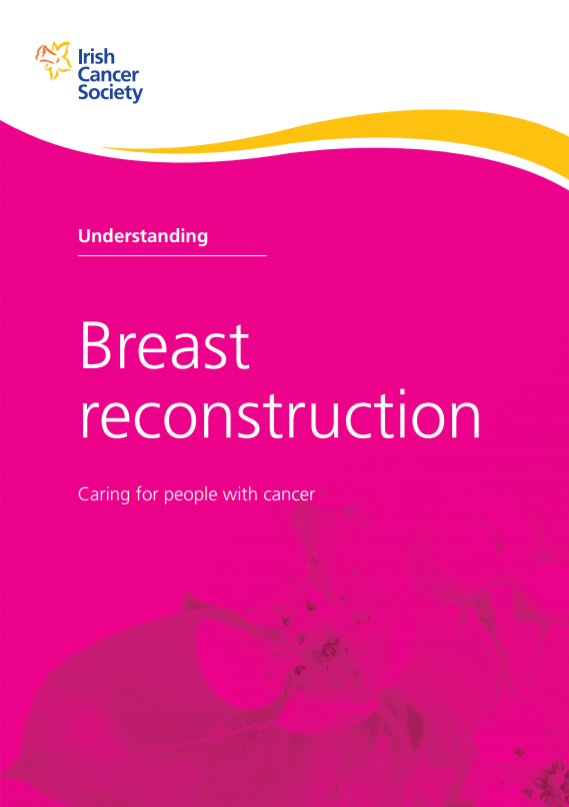Breast reconstruction
This means making a new breast shape for you after you have had breast cancer surgery.
What is breast reconstruction?
Breast reconstruction means making a new breast shape for you after you have had breast cancer surgery. It’s done using an implant, your own body tissue or a combination of both.
Everyone is different, so your surgeon will talk to you about your options and what might be best in your case.
There are different ways of doing breast reconstruction. Depending on the technique used, you might need a number of procedures to get the best result. For example, creating a new nipple, having breast implants or reconstruction using a flap of your own tissue. You may have a choice, or there may only be one type of surgery that can be recommended.
Who does breast reconstruction surgery?
Breast reconstruction is done by either a specialist oncoplastic breast surgeon or a plastic surgeon trained in breast reconstruction. Depending on their experience, a plastic surgeon with a special interest in breast reconstruction can usually offer you a wider choice of more complicated surgeries.
In many cases, both the breast surgeon and the plastic surgeon work together to do more complex surgeries.
When can I have breast reconstruction?
You can have reconstruction at the same time as your breast cancer surgery (immediate reconstruction) or months or years later (delayed reconstruction). The timing will depend on your personal preferences, medical needs and the type of treatment you’re having.
You might be able to have your reconstruction at the time of your breast cancer surgery, if you’re ready to make a decision early on. In some cases, immediate reconstruction can give a slightly better cosmetic result. Ask your surgeon about this.
Benefits
- More of your breast skin can be preserved. This can give a more natural-looking shape and appearance.
- There may be less scarring on the breast itself.
- You will need fewer operations.
- You will have a new, reconstructed breast when you wake up after your mastectomy or breast-conserving surgery.
Disadvantages
- If you have any complications after surgery, it might delay you starting any chemotherapy you need.
You may not feel ready to think about reconstruction until months or years later, or for medical reasons, you might be advised to wait.
Benefits
- You have more time to consider if reconstruction is right for you.
- It may be less stressful if you are taking it just one step at a time.
Disadvantages
- Your body will look different if you haven’t had reconstruction, especially if you’ve had a mastectomy. This might affect your self-esteem and body image.
You may need to have more treatment after your surgery. For example, chemotherapy or radiotherapy. You may prefer to wait until you have finished all your treatment, or your surgeon may advise you that it’s best to do this.
Other treatments may affect the best type of reconstruction for you or when you have reconstruction. For example, there’s a risk that radiotherapy could shrink or harden the tissue used to make your new breast. It could also affect the overall result of your breast reconstruction. However, certain forms of breast reconstruction tolerate radiotherapy better than others
Making a decision about reconstruction
Not every woman who has breast surgery will want to have a reconstruction, but it’s a good idea to find out about it and think about your options.
- Read the information you’re given about breast reconstruction.
- Talk to your breast care nurse and consultant about your options.
- Ask your breast care nurse to put you in touch with someone who has been through similar surgery.
- Weigh up the pros and cons and think about what you want. Be realistic in your expectations of breast reconstruction.
- Make the decision for yourself and not for anyone else. Consider your your body shape and weight, having stretch marks/surgical scars and your overall feeling about having more surgery.
We have more information on possible complications after breast reconstruction surgery
Your general health can affect your risk of complications after surgery. For example:
- Your age
- Fitness for surgery
- Other medical conditions, such as high blood pressure or diabetes.
- Smoking is also a big factor. It has a negative effect on your blood circulation and how your wounds heal.
If you are considering breast reconstruction, it is strongly advised that you quit smoking.
You can also talk to one of our cancer nurses. Call our Support Line free on 1800 200 700 or visit a Daffodil Centre. You can ask the nurses for a free copy of our booklet, Understanding Breast Reconstruction, or download it below.
Talk to a Cancer Nurse

Support Line
Our Daffodil Centres


